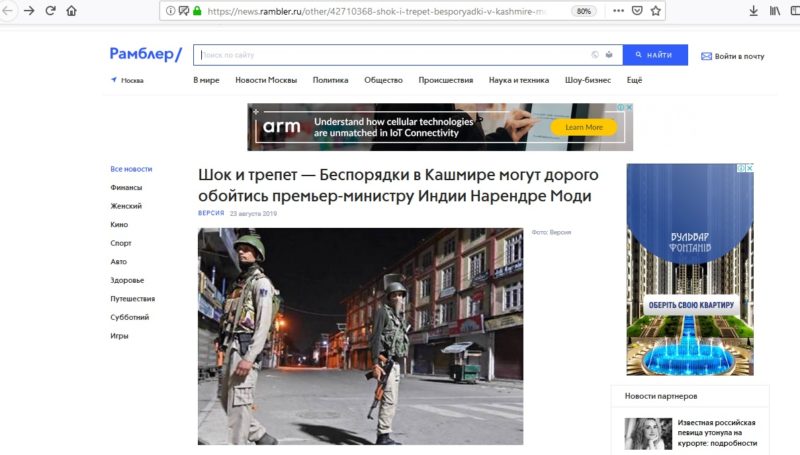Monitoring Desk: “The Indians proudly say that Kashmiris are our fellow citizens. But their living conditions are terrible today: shops and gas stations are closed; fuel and other necessities begin to run out; people can’t even watch TV if they don’t have satellite connection. The vast majority of “our fellow citizens” in Kashmir live in conditions of almost total eclipse.
Even worse, by arresting democratic leaders, the government creates space for undemocratic forces.”.
This is observed in a Special Report published by one of the biggest Russian web portals ——-Rambler.
Rambler provides news, news aggregation, news search, e-commerce and other services to the Russian-speaking community globally. It is complemented by a number of other Rambler Media Group including Lenta News (Russian) Agency.

A breathtaking betrayal of Indian democracy
The Special Report titled “Шок и трепет — Беспорядки в Кашмире могут дорого обойтись премьер-министру Индии Нарендре Моди” (Translation as: Shock and awe – Riots in Kashmir can cost dearly to Indian Prime Minister Narendra Modi), indicates after seven decades, when the people of Jammu and Kashmir, the only Indian state with a Muslim majority, and the international community were confident that the state would maintain its special status in accordance with the Indian constitution, the government unilaterally divided it.
Original Report in Russian language can be read to click here
Translation of Special Report is hereunder:
The Modi administration formed union territory on the high plateaus and hills of Ladakh in the eastern part of the state and reduced the autonomy of the rest of the state – still called Jammu and Kashmir. The status of the region is lowered from state to union territory (the territory is directly controlled by the federal government, although it may have an elected legislative body and a government with limited powers).
Many in India are worried that, as with demonetization, the short and medium term damage caused by Modi’s decision will far outweigh the theoretical long-term benefits.
First of all, this is a breathtaking betrayal of Indian democracy: the government changed the constitutional relations of the people of Jammu and Kashmir with the Republic of India without consulting with them or their elected representatives.
The government stated that the consent of Jammu and Kashmir (as required by the Indian constitution) was obtained. But Jammu and Kashmir are under direct federal rule, so the “state” was transferred as the “governor” appointed by New Delhi. In fact, the government has received its consent to amend the constitution.
Worse, the decision was submitted to parliament, where the majority of the ruling party, Bharatiya Janata (BJP), guaranteed its speedy adoption without consulting local political parties.
Democratically elected political leaders of the state are arrested for preventive purposes, educational institutions are closed, and communications – television networks, mobile phones, landlines and the Internet – are disconnected. Even if the government can convince skeptics that it adheres to the letter of the law, its decision betrays the spirit of Indian democracy.
The damage is already becoming apparent. Tourism, Kashmir’s life buoy, has waned: decades of efforts by Indian governments to cancel warnings from foreign governments to travel to Kashmir because of security concerns have been in vain. The irony is that Modi, during a visit to Kashmir in 2017, called on young people in the state (where the unemployment rate is much higher than the average for India) to choose between tourism and terrorism. Tourism could be the choice of many of these unemployed youth. But now foreign governments are issuing recommendations again, the shikars (houseboats) are ruined, and the artisans and carpet-makers, the great artisans of Kashmir, went bankrupt.
The Indians proudly say that Kashmiris are our fellow citizens. But their living conditions are terrible today: shops and gas stations are closed; fuel and other necessities begin to run out; people can’t even watch TV if they don’t have satellite connection. The vast majority of “our fellow citizens” in Kashmir live in conditions of almost total eclipse.
Even worse, by arresting democratic leaders, the government creates space for undemocratic forces.
The government said it was winning the battle against terrorism, but now it has given them a new life. This made the main pro-Indian parties (whose leaders were arrested) powerless to stop extremists. Misguided young Kashmiris can join them and do more harm to Indian soldiers. When the United States finally leaves Afghanistan and the Taliban victory is over, a large number of idle jihadists will be ready to continue Pakistan’s fifty-year effort to send “militants” to India. The Modi government gave them an additional reason for war.
The international implications of Modi’s decision are embarrassing and troubling. In one fell swoop, the government not only dropped seven decades of guarantees to the international community and the United Nations, but also angered Pakistan, a hostile neighbor with its own claims to Kashmir. Pakistan has already lowered diplomatic relations with India, expelled the Indian High Commissioner, halted bilateral trade, and is expected to bring the matter to the UN.
While some governments have expressed understanding of India’s actions, it is too early to predict what might happen. Internal tensions fueled by outside supplies, militants and weapons, will inevitably increase.
The Modi government also informed the world of its abandonment of its previous emphasis on economic growth and foreign investment. Investors who have already left India do not like military action; now they can run in droves. Initially gaining power, committing himself to put development first, Modi then sought re-election, campaigning as a candidate for national security and doubling traditional Hindu chauvinism. With his action in Kashmir, Modi remakes India in the image of the BJP – away from the land of Mahatma Gandhi and Jawaharlal Nehru, who preached non-violence, religious coexistence and acceptance of differences.
Those who have long regarded the democratic diversity of India as their greatest strength are now facing a government that intends to erase all signs of this and demonstrates disrespect for the constitution. This is an ominous time for Indian minorities and other dissenters.
